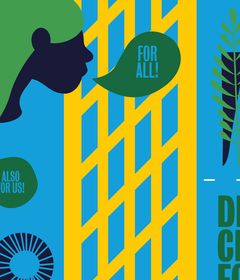Take a moment to think about ‘Nature’. What images come into your mind? Trees, ocean, or animals? Often nature is depicted as a separate entity from humans. But nature also exists within our body. Such as the micro-organisms that support our digestive systems and affect our neurological health as the ‘second brain’. Despite these interdependent relationships, non-human beings are often overlooked, unseen, and exploited. As a way to better understand their voices and interests, there is a rising movement to give moral and legal personality to nature and represent their voices in society. These initiatives address injustices towards non-human beings. But ultimately, one could critique the binary separation of human/non-human is still present as human (us) gives voices to non-human (them) .
How can we understand and live together in the world without falling into a human-centric mindset? This DCFA RE-generation Special program focuses on the practices and ideas that listen to the voices of multispecies and represent them in society. Together with thinkers and artists, we will challenge the dualism of humans and nature and speculate the worldview of a regenerative future.
About the speakers
Leon Lapa Pereira (he/him), is a cross-disciplinary performance researcher, who creates experienceable ecologies bridging humans and more-than-humans. He uses anthropomorphizing methods to translate relational worlds and biological processes into movement, robotic agents, and performances. With an engineering background, he examined knowledge production after enrolling in the Master’s ArtScience in The Hague. Here, Leon established a performative and curatorial art practice and became a hosted program facilitator of Flipchart at the Instrument Inventors Initiative during his studies. Merging performances and technologies, he built a robust network in Randstad that he aims to expand as a lab coordinator at the Performance Technology Lab . Beyond his performance work, he co-founded WASTELAND Festival , initiated the interdisciplinary Resonant Bodies residency in Georgia, teaches at the Royal Academy of Art The Hague, and is a Creative Producer at the Embassy of the North Sea . At the latter, he combined his research interest with his activist ideologies, which led to co-developed the Network of European Waterbodies . Currently, he is researching the topic of ecology for the Manifesta15 in Barcelona.
Jechiam Gural explores interactions with microbes almost on a daily basis at Baking Lab , a special micro bakery and cafe in Amsterdam where sourdough bread is baked and new recipes are developed to reduce food waste. The place has become a kind of hub for all kinds of bakers and people who want to learn more about fermentation, bread, food and health. Baking Lab is an example of how artisan bakeries can help support place-making and contribute to their communities in an inspiring way. He developed a novel community art project exploring the impact of running on the creativity of the human brain to promote innovative ideas about sustainability (Pollen Ideas). Jechiam also co-founded an R&D software company (Noterik BV) that collaborated with national and international research organizations to develop new information indexing and retrieval solutions to support educational and innovative multimedia interactions. Before becoming an R&D entrepreneur he completed his MSc Biology studies at the University of Amsterdam.
Jasmijn Leeuwenkamp is a doctoral candidate in philosophy at Amsterdam School of Cultural Analysis (University of Amsterdam). Her research focuses on anthropocentrism in human rights and explores the interrelationships between political philosophy, ecology, and rights-based environmental protection strategies. She has written on topics like posthumanism, religion and ecology, and colonial legacies in ideas of nature.
Within her practice Rosalie Bak uses methods such as erasure, assemblage, inquiry, scores, trance writing and associative drawing to investigate the ambiguity of (her) personal experience and the relationship between the human, weather, micro-organisms, death and nature. In doing so she views the ‘collage’ as a theme, enabling her to bring forth and include all entanglements. Her current work is mainly experiential and collaborative in nature, working with the walk as a way of mapping and engaging with inner/outer weather, exploring the field of Necro-Ecology as a deepening paradigm within the field Bio-design and sustainable developments and investigating eco-Haptonomie as an embodied and tactile ways of relating to complex eco-social systems.
About Designing Cities for All: RE generation
Over the past two years of Designing Cities for All (DCFA) we’ve learned about exclusion by design and the (re)-design of inclusive cities. Along the journey, a certain question kept popping up: what exactly does ‘for all’ entail? After focusing mostly on the ‘who’ over the past two years, DCFA is rebooting as Designing Cities for All: RE-generation . This time around, the series is also incorporating the ‘what’ by looking through the fresh lens of regenerative design . This emerging field might very well be a promising answer to the challenges of our time, as it focuses on the (re)-design of products, services, and ecological recovery that keeps the systems healthy.


This network, based in Sweden, engages with critical posthumanism via design practices, education, and research. Designers and scholars explore how design can grow and thrive in contact with posthumanism – and how designerly and artistic approaches in turn can inform the ongoing discussion around critical posthumanism and related discourses.

Using the Nukabot, a pickling bucket robot he developed with his team, informatics researcher Dominique Chen has been studying how humans can develop a sense of coexistence with microbes. We talked with him about the possibility of coexistence and synlogue*3 with nonhuman species.
(Reprinted from the DESIGN VISION Annual Report 2021 booklet published in October 2021)

This conversation was first published in Errant Journal #2 on Slow Violence titled ‘Introduction to the Court for Intergenerational Climate Crimes (CICC)’ as part of a special on climate justice edited by Radha D’Souza and Jonas Staal. The journal issue also features contributions by the CICC judges on intergenerational climate crimes.










